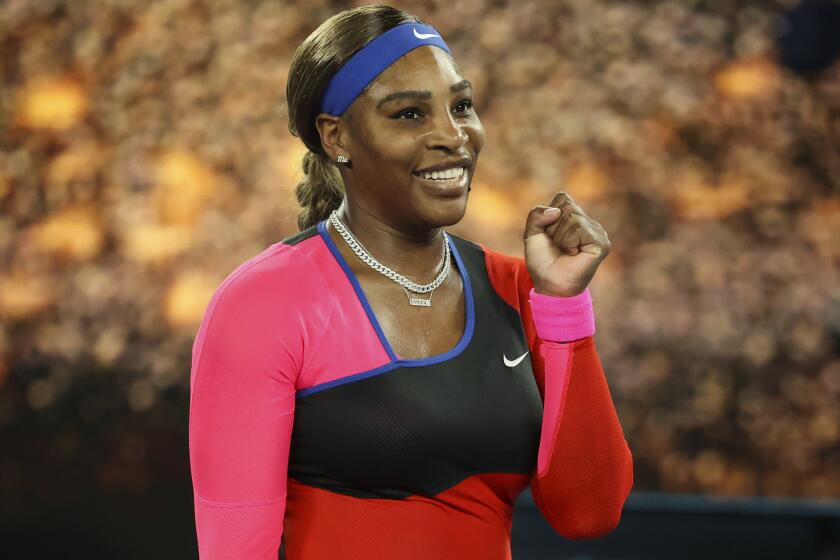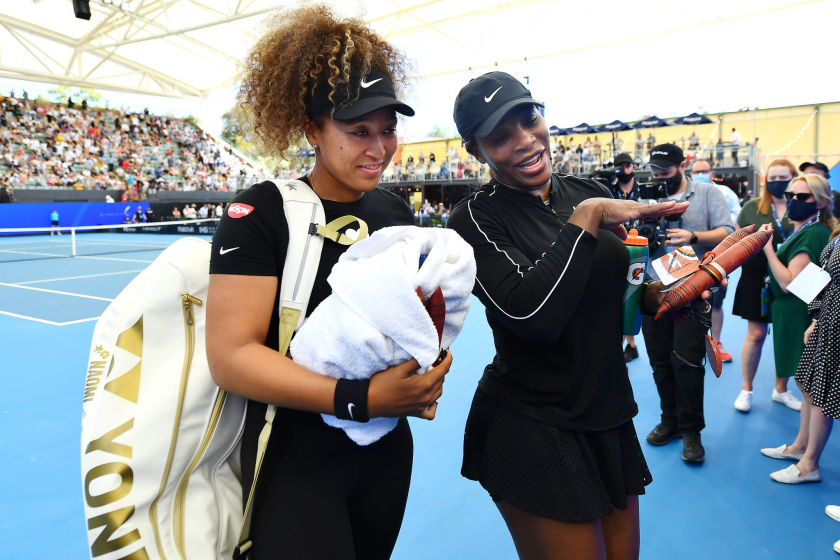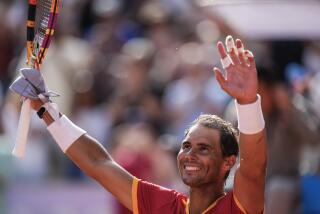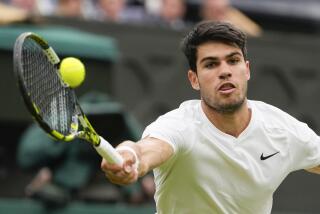Australian Open: No. 1 Ash Barty, No. 2 Rafael Nadal upset in quarterfinals
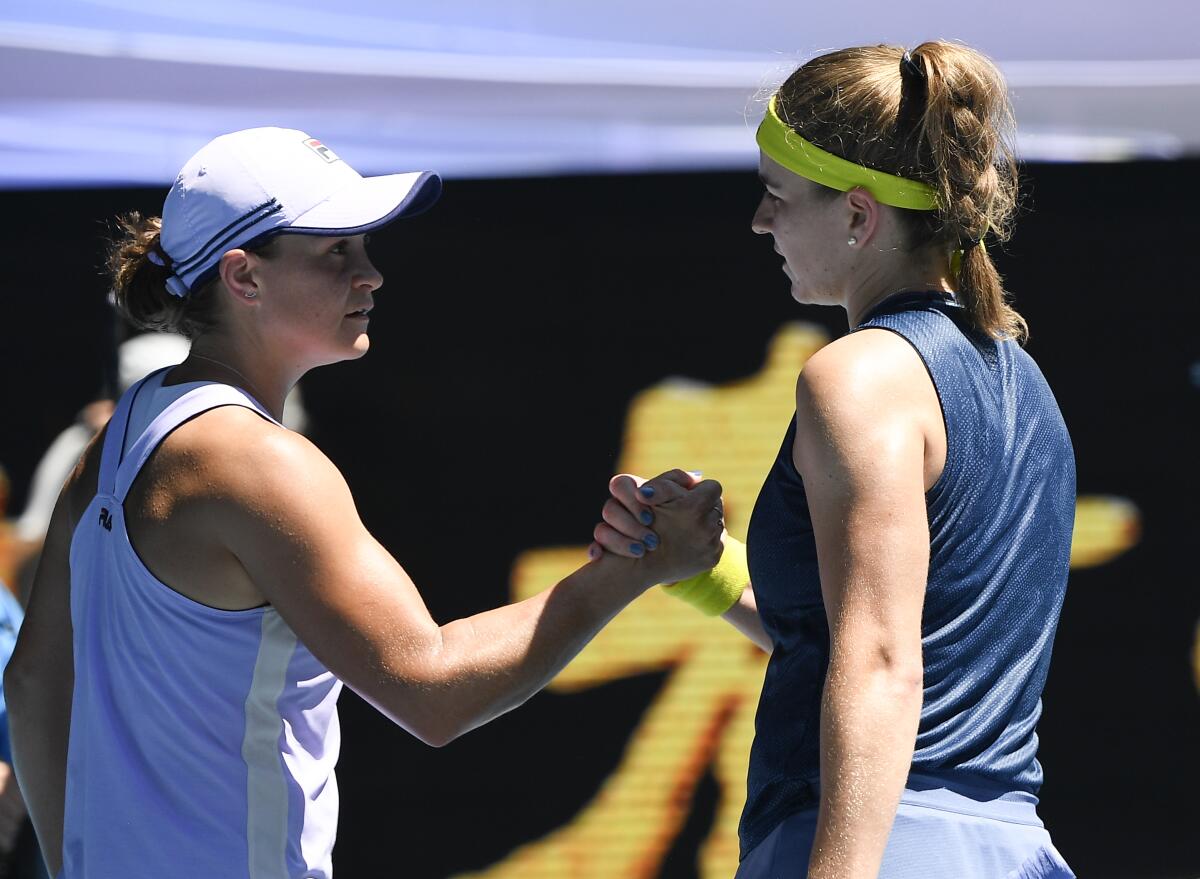
- Share via
MELBOURNE, Australia — Top-ranked Ash Barty built a big lead in her quarterfinal match at the Australian Open before her opponent took a medical timeout and left the court.
More than an hour later, it was Barty heading abruptly through the exit. She was upset Wednesday by Karolina Muchova, 1-6, 6-3, 6-2.
Seeded No. 25, Muchova earned her first semifinal berth in a Grand Slam. Her comeback win ended Barty’s bid to become the first Australian woman to win the title in Melbourne since Chris O’Neil in 1978.
“It’s heartbreaking, of course,” Barty said. “But the sun will come up tomorrow. You’re either winning or you’re learning, and today is a massive learning curve for me.”
Muchova’s opponent Thursday will be Jennifer Brady, who beat fellow American and good friend Jessica Pegula 4-6, 6-2, 6-1. Brady reached her second consecutive Grand Slam semifinal.
“I hope I make it a habit,” she said. “Hopefully I have a new habit of making finals.”
Serena Williams has returned to the Australian Open semifinals for the first time since she won the tournament in 2017.
Seeded 22nd, Brady struggled at times and gave her racket an angry toss midway through the second set. The unseeded Pegula, who advanced beyond the third round at a major for the first time, appeared to tire down the stretch.
“We’re such good friends,” Brady said. “I’m really happy for her success. I know we’ll be having a lot more tough battles.”
Muchova played poorly at the start of her second major quarterfinal, and Barty raced to a 5-0 lead while losing only six points. After nine games, Muchova had one winner and 18 unforced errors, and early in the second set, she took a medical timeout that lasted nearly 10 minutes.
Sunny weather, with the temperature in the mid-80s (30 degrees Celsius), was a factor, Muchova said.
“I think it was a bit of the heat,” she said. “It got to me, and I was feeling kind of dizzy, really lost and almost fainting. I just asked for help.”
Medical personnel took her temperature, checked her blood pressure and gave her ice before she left the court. When the Czech returned, she played much better.
“I tried to play a bit faster rallies so we don’t play long ones as in the first set,” Muchova said, “and it worked well.”
Barty had no complaints about Muchova halting play.
“It’s within the rules,” Barty said. “She’s within her rights to take that time. That shouldn’t be a massive turning point in the match. I’m disappointed I let that be a turning point.”
Comebacks have been a staple in the tournament for Muchova, who rallied in earlier matches to win sets after trailing 5-0 and 4-0.
Against Barty, she began moving into the court to hit her groundstrokes earlier. Barty, pushed behind the baseline, became indecisive and erratic.
Williams and Osaka will face off during normal waking hours in an Australian Open semifinals that’s been described as a Brady-Mahomes-like showdown.
During one stretch Muchova won eight of nine games. Barty finished with 37 unforced errors and lost serve four times in the final two sets.
“I just overplayed,” Barty said. “I just pressed a little bit too much, and gave up too many cheap errors at some pretty critical times.”
Muchova’s only other victory over a Top 5 player was against No. 3 Karolina Pliskova at Wimbledon in 2019.
Brady was in a two-week had lockdown before the Australian Open because she was among the players who shared a charter flight to Australia with someone who later tested positive for COVID-19.
The former UCLA star reached her first major semifinal at the U.S. Open in September before losing to eventual champion Naomi Osaka.
Nadal upset by Tsitsipas
Rafael Nadal entered his Australian Open quarterfinal with a 223-1 record when grabbing the first two sets of a Grand Slam match.
Thanks to his own mistakes — and some spirited play by Stefanos Tsitsipas — that mark is now 223-2.
A couple of uncharacteristically sloppy overheads and a framed backhand in a third-set tiebreaker began Nadal’s undoing, and his bid here for a men’s-record 21st major championship eventually ended Wednesday with 3-6, 2-6, 7-6 (4), 6-4, 7-5 loss to the younger, sharper Tsitsipas.
“Was little bit of everything, no? I missed a couple of balls in the tiebreak that I shouldn’t — that I could not — miss if I want to win. And that’s it,” said Nadal, who briefly left the Spanish portion of his post-match news conference after clutching at his cramping right hamstring.
“I have to go back home,” Nadal said, “and practice to be better.”
At his put-the-ball-where-he-wants-it best in the early going, Nadal went ahead rather easily, winning 27 consecutive points on his serve in one stretch and running his streak of consecutive sets won at major tournaments to 35, one shy of Roger Federer’s record for the professional era.
Nadal and Federer are currently tied at 20 Grand Slam singles titles, more than any other man in the history of a sport that dates to the late 1800s.
But Tsitsipas never wavered and that surprisingly poor tiebreaker by Nadal helped hand over the third set and begin the comeback.
“I started very nervous, I won’t lie,” the fifth-seeded Tsitsipas said. “But I don’t know what happened after the third set. I just flied like a little bird. Everything was working for me. The emotions at the very end are indescribable.”
As Tsitsipas played, in Nadal’s estimation, a “very, very high level of tennis” over the last two sets, the 34-year-old Spaniard’s play dipped considerably.
Nadal made a total of only 10 unforced errors in the first two sets combined, then 32 the rest of the way — 11 in the third, 14 in the fourth, seven in the fifth.
The only other occasion in which Nadal went from a two-set advantage to a defeat in a Slam came at the 2015 U.S. Open against Fabio Fognini.
Tsitsipas — a 22-year-old from Greece with a flashy game — will meet 2019 U.S. Open runner-up Daniil Medvedev in the semifinals Friday.
Neither Tsitsipas nor Medvedev has won a Grand Slam tournament.
More to Read
Go beyond the scoreboard
Get the latest on L.A.'s teams in the daily Sports Report newsletter.
You may occasionally receive promotional content from the Los Angeles Times.
